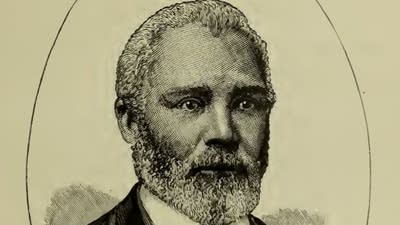Justin Holland, guitarist, pianist, flutist, composer, and civil-rights activist, was born on July 26, 1819, to Exum Holland, a free Black farmer in Norfolk, Virginia. He had two brothers and five sisters. He demonstrated considerable talent when he was eight by using a small book of verses as a foundation for writing accompaniments.
In 1833, at 14, Holland left after the death of his parents for Chelsea, Massachusetts, as the South was not a comfortable place for free Blacks. In Chelsea, Holland changed his name to William Justin Holland White. The reason is unknown. He began guitar studies with Senor Mariano Perez. Two years later, in 1835, he was accepted into the Oberlin Conservatory of Music in Oberlin, Ohio, after Asa Mahan, a renowned social reformer and clergyman and the first president of the institution, argued for women’s rights and equal education irrespective of color and the trustees unanimously agreed, thus making Oberlin the only institution at the time to adopt such a policy and Holland among the first Blacks admitted. However, he did not attend at that time. From 1838 to 1840, Holland spent time learning Spanish in Mexico in preparation for the works and pedagogy of the Spanish guitar master Aguado Giuliani Sor. In 1841, he enrolled in Oberlin, studying flute and composition. He left in 1843 for work and returned in 1845 to continue his studies. However, there needs to be evidence of the completion of the degree. Holland also married Daphine Howard Minor in 1845. They parented two daughters, Justina Holland and Clara Monteith Holland, and a son, Justin Minor Holland.
Holland legally returned to his birth name in 1847. In 1848, he attended the National Convention of Colored Freemen in Cleveland, Ohio, in the Courthouse presided by abolitionist Frederick Douglass. As a top personality in the anti-slavery and civil rights movements activist, he directed the enslaved to the Underground Railroad. He was secretary overseeing “The Central American Land Company,” an organization that made several attempts to purchase land in Central America to institute a free black colony. It was not a successful project. However, in 1858, Haiti offered free passage and aid for black settlers and emigrants who relocated there as Holland lived there until 1862. During his tenure in Haiti, Holland composed more than 35 original works and 300 arrangements of operatic themes.
In 1874, Holland’s book Modern Method for the Guitar was released. Two years later, in 1876, Holland’s Comprehensive Method for the Guitar was published.
From 1881 to 1883, Holland served as Deputy Grand Master of Eureka Grand Lodge no. 14 in Cleveland and was its Chief of Foreign Affairs. He became ill in 1886 and left Cleveland to stay with his son Justin Minor Holland in New Orleans, Louisiana. In New Orleans, Louisiana, Justin Holland died of a brain illness at his son’s home on March 24, 1887. He was 67.

